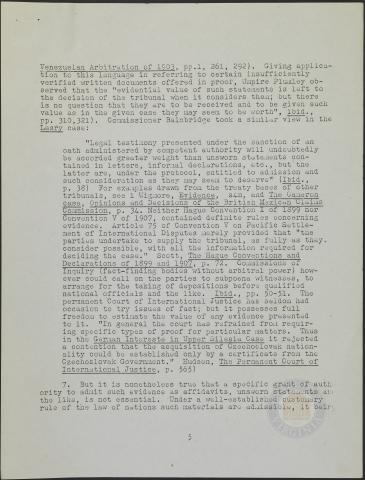
Page 5
| Parent | Perpetuation of testimony by Witnesses in U. S. for Presentation to the International Military Tribunal |
|---|---|
| Date | 18 June 1945 |
| Language | English |
| Collection | Tavenner Papers & IMTFE Official Records |
| Box | Box 3 |
| Folder | General Reports and Memoranda from June 1946 |
| Repository | University of Virginia Law Library |
Venezuelan Arbitration of 1903, pp. 1, 261, 292). Giving application to this language in referring to certain insufficiently verified written documents offered in proof, Umpire Plumley observed that the “evidential value of such statements is left to the decision of the tribunal when it considers them; but there is no question that they are to be received and to be given such value as in the given case they may seem to be worth”, ibid., pp. 310, 321). Commissioner Bainbridge took a similar view in the Lasry case:
“Legal testimony presented under the sanction of an oath administered by competent authority will undoubtedly be accorded greater weight than unsworn statements contained in letters, informal declarations, etc., but the latter are, under the protocol, entitled to admission and such consideration as they may seem to deserve” (Ibid., p. 38) For examples drawn from the treaty bases of other tribunals, see 1 Wigmore, Evidence, s4m, and The Cameron case, Opinions and Decisions of the British Mexican Claims Commission, p. 34. Neither Hague Convention I of 1899 nor Convention V of 1907, contained definite rules concerning evidence. Article 75 of Convention V on Pacific Settlement of International Disputes merely provided that “the parties undertake to supply the tribunal, as fully as they consider possible, with all the information required for deciding the case.” Scott, The Hague Conventions and Declarations of 1899 and 1907, p. 72. Commissions of Inquiry (fact-finding bodies without arbitral power) however could call on the parties to subpoena witnesses, to arrange for the taking of depositions before qualified national officials and the like. Ibid., pp. 50-51. The permanent Court of International Justice has seldom had occasion to try issues of fact; but it possesses full freedom to estimate the value of any evidence presented to it. “In general the court has refrained from requiring specific types of proof for particular matters. Thus in the German Interest in Upper Silesia Case it rejected a contention that the acquisition of Czechoslovak nationality could be established only be a certificate from the Czechoslovak Government.” Hudson, The Permanent Court of International Justice, p. 565)
7. But it is nonetheless true that a specific grant of authority to admit such evidence as affidavits, unsworn statements and the like, is not essential. Under a well-established customary rule of the law of nations such materials are admissible, it being
5
